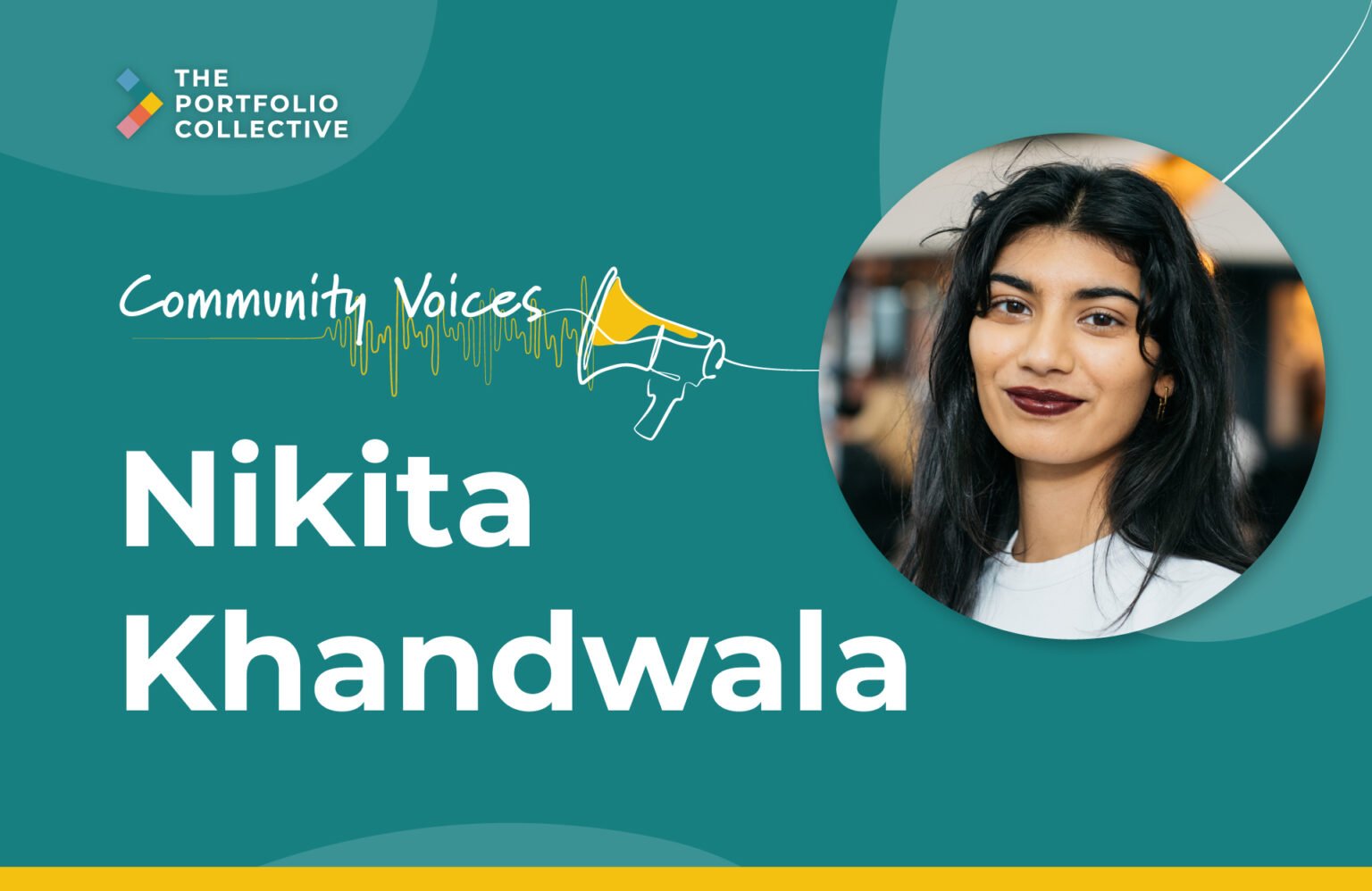Ella Bernie
Ever since she left university, Nikita Khandwala knew she wanted to craft an intentional and meaningful career. Now, she helps others do the same, and she’s a shining example of the new generation of Gen-Z portfolio professionals.
She’s fascinated by what the future of careers will look like and passionate about empowering individuals to be more intentional when it comes to what they do for work. Needless to say, there’s plenty of synergy between what Nikita does and our values here at The Portfolio Collective.
For our latest Community Voices article, we sat down with Nikita to learn how she proactively future-proofs herself for a new world of working and why she’s eager to help others do the same.
Hi Nikita, could you please introduce yourself and tell us a bit more about your background and what you do?
Of course! I’m a creator, consultant and ‘future proofer’. So a lot of what I do involves working with individuals, universities and companies to help them future-proof themselves for a very different world of work; one that’s fueled by AI, one where organisational norms – in terms of where we work, how we work and what we work on – will change a lot.
That takes the form of a bunch of different projects in what I’d say is an experiment or lab-based approach to building a career. I’ve built a couple of courses – one focused on upskilling teams with AI and another for career switchers focused on helping them future-proof themselves and improve their employment outcomes through career transitions. I also consult with companies on their AI strategies and how they can integrate AI into their daily practices and workflows so that they produce better results and become an AI-powered team. In addition, I work with a range of UK universities to craft bespoke solutions that help their students gain a greater sense of agency and effectively become the CEO of their careers.
Aside from that, I do a couple of other things centred around my North Star, which is how we can help people find more meaning in their careers and what they choose to do with their life. And then, on a macro level, how we can mobilise more people around really meaningful problems in society and the economy.


You mentioned it a little bit already, but it would be great to hear more about your focus on AI and future-proofing careers. What sparked your interest in that as a subject?
I initially got into it because I’ve been a portfolio professional pretty much since I left university and started my career – even before that, actually. I was constantly working on business ideas or running various social enterprises and societies. I got into this space of future proofing, skills and education, and, specifically, what the future of careers looks like because I’m really fascinated by why people choose to dedicate their working lives to something.
We spend 80,000 hours of our lives working, on average, although that’s probably more now! And I feel like our education system, as it stands, makes it seem like our careers are something that happens to us as opposed to something we intentionally craft. So a lot of my work is about really empowering people to be more intentional about how they’re spending their time, how they’re making money and how they’re adding value to people around them.
I’m fascinated by how individual people make decisions. But also, at the systems level, there’s this intersection of pressing and neglected problems which is something that Effective Altruism talks about quite a lot. My belief, in terms of how we can improve the world, is that we’d be able to tackle these challenges so much more effectively if we were able to get more values-aligned talent mobilised around those problems. But we often don’t know what the problems are, how to create career paths to get there and how to make that career path financially feasible. So that’s the inspiration for what I do.




That’s so interesting! And it ties really nicely into what we’re talking about at TPC at the moment around learning, development and finding the right tools for success. You’ve spoken about it a little, but how do you make sure you’re ‘staying ahead’ and proactively learning?
I think learning is important for any professional, but it’s especially important that portfolio professionals become lifelong learners because things are just changing so rapidly. I read somewhere that the shelf life of a skill is two to three years, so if you don’t proactively take reskilling seriously, you’re going to get left behind. I hate that term, in general, but I think that says a lot about why it’s so important to focus on rebuilding those more timeless or durable skills; skills like systems thinking, critical thinking, being able to ask really great questions, communication and creativity, as well as being aware of the technological advancements that society is making, whether it’s in generative AI or no code development or whatever else.
In terms of how I personally deal with that, I actually started a new practice recentlyI love reading about pretty much anything and everything. But I went through a period where I was just not making the time and I actually felt I had insufficient inspiration when I was writing and creating my own content because of it. Now, I actually carve out an hour at the beginning of the day just to read. That seems like a huge chunk of time for what I see as a leisure activity, but I’ve come to realise that because writing and research is such a core part of my work, I have to feed it with something. Regardless of whether you’re a writer or not, feeding your curiosity is really important.


We couldn’t agree more! And, you’re still relatively early in your career, so it’d be great to hear more about why you decided to have a portfolio career and do things a little differently.
I’m stimulated intellectually and emotionally by a lot of different things. I did work in corporate for a year when I worked at LinkedIn. I really loved the company, loved the people and definitely learned a lot. But I missed the pace of the startup world and, more than that, I missed the agency I felt I had in terms of choosing how to apply myself and invest my time and energy. It’s definitely not something that everyone feels and I’m never going to say that having a portfolio career is the right way to do things for everyone. I think it takes a very specific sort of person, with specific characteristics, to take this path. It’s really hard, which is why communities like TPC exist, right? Creating a community and having that space for shared vulnerability and sharing challenges and learning is one of the hardest things to find on this route.
I’m still early on, but I think we’re going to see a massive uptick in the number of people pursuing portfolio careers. One, because Gen Z are the first generation of digital natives i.e. the people who have grown up with technology. Growing up with technology has shortened our attention spans and people don’t always like to talk about that, but it’s true. I think we’re seeing that manifest in how young people are building their careers. I also think that young people feel like they have more agency than older generations because we’re surrounded by global news and global challenges and people want to do something about it.
With your career so far, what would you say has been your biggest learning to date?
That’s a really big question! I’ve failed a lot. And I failed way more in the years since I’ve started my career than I failed throughout my educational journey. I’d always been a good student and grades in school were my safe place. But then, the real world came at me and I realised a lot of what helped me succeed in education wouldn’t fly in the world of work, which is another reason I’m passionate about the work that I do and crafting different pathways for different sorts of people.
Because I chose this weird squiggly career route, I’ve had issues with confidence and self-worth, asking myself “why am I not landing clients?” or “why is my business failing?”. But what’s constantly got me through those tough periods has been making myself a promise and delivering on it. If you get into a bad habit of not treating the promises you make to yourself as you would the promises you make to others, then your self-worth can take a bit of a dive.


If I had to choose another lesson, it would be that all business problems are people problems and expectation management is everything. If I could go back and tell my 18-year-old self to watch out for these things then I would have made quite a few different decisions in my career and maybe found things easier. But that’s the gift of hindsight, right?
For sure! A super broad question from us now, but where do you see yourself going next? What would be your ideal working situation in a year or five years time?
I’ve actually been thinking about this a lot recently! I think as a portfolio professional that it’s quite difficult to envision what a year, two years or 5 years in the future looks like. For me, one realisation I had recently is that I’m quite an intellectual. I love thinking, researching and writing; that’s where I get a lot of joy. But the other half of me is all about people, community-building and educating, so my dream scenario would be to marry research, content and education together. I don’t know exactly what that looks like in terms of a working day or week, but I know what the important elements are.
We can definitely relate to that, portfolio careers can be uncertain at times! A final question from us: what advice would you give to someone who’s thinking of switching paths and starting a portfolio career?
It’s less advice and more of a mindset shift, which is the idea that you’re the CEO of your career. This is a mental model I’ve found to be quite helpful. For example, as a company you need a brand, so how do you build your personal brand? As a company you need a board of advisors, so how do you build a personal board of advisors? These sorts of questions have been really helpful in eliciting answers that have actually helped move the needle in my career and hopefully for other people that will be the same.
It speaks to what I mentioned earlier about how we’re conditioned to believe our careers are something that happen to us, when it’s actually so much more nebulous and complex than that. If people believe that they have the agency to craft their careers, they’re likely to be a lot happier and derive meaning from how they spend time.




Inspired by Nikita’s story? So are we! It’s such an amazing example of how being proactive, prioritising learning and keeping up with the latest trends and developments can lead you to a truly inspiring career, no matter your age or experience. Nikita is the embodiment of how dedication, self-belief and hard work can produce a fulfilling career where your agency, autonomy and freedom are never compromised.
If you’d like to meet more inspiring professionals who are forging their own career paths, then join our community and start engaging with our members. You never know what you might discover about yourself or your potential.
Think this sounds like the right path for you? Come along to our monthly Get started event for new members to find out what a portfolio career could look like and how The Portfolio Collective can help you take those first steps towards professional success – and don’t forget to connect with our community!



